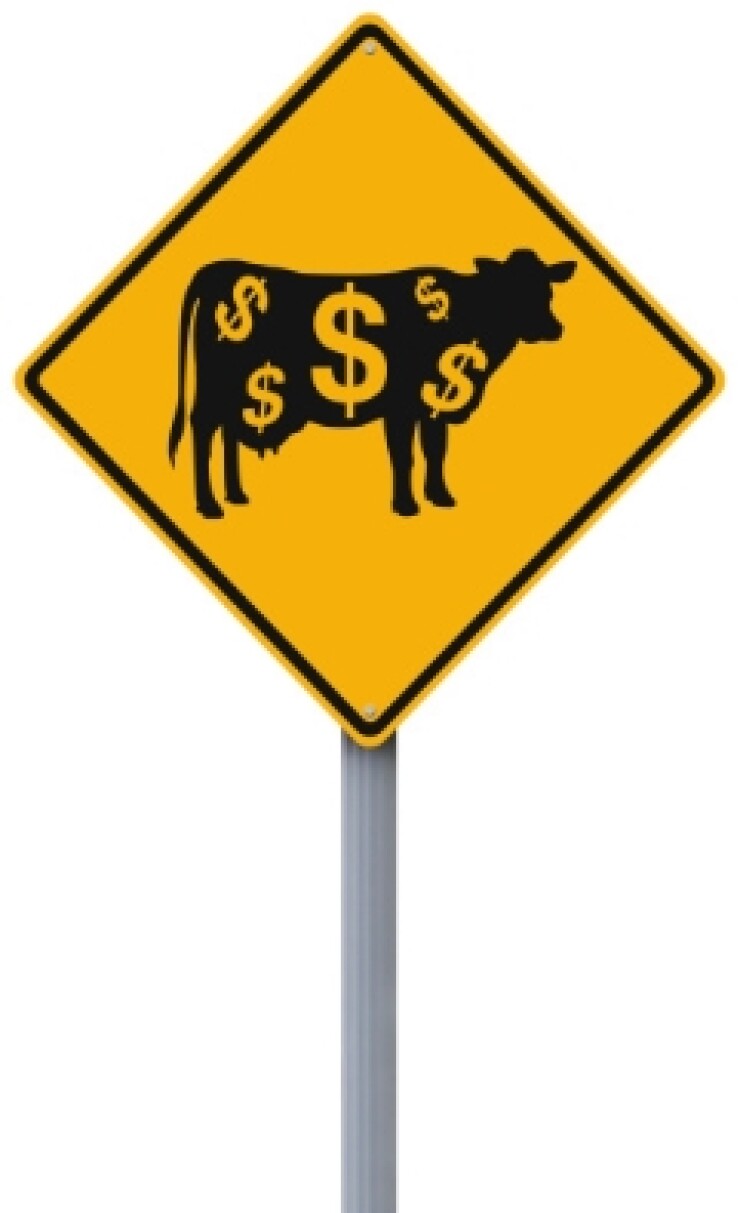A manure-to-energy deal brought to market by Goldman Sachs Group Inc. is hitting the fan.
Arizona’s

Ranchers are intrigued by the thought of benefiting from a bovine byproduct: “I’d like to see it go to some useful purpose rather than just going to the dump,” said Chuck Backus, who rides herd on hundreds of cattle in Gold Canyon.
But after less than a year, the groundbreaking renewable-energy bond sale has run into problems, including several technical defaults. WOF repeatedly broke the terms for a variety of reasons after a project delay and blowing its budget by about $9 million. That led Equilibrium to step in with more money. Then, there’s the volley of lawsuits between WOF and former contractor Quasar Energy over a disputed bonus.
The saga has left municipal bondholders at risk as they seek profit in green innovation. Ventures seeking to create biofuel, sustainable wood and fertilizer have enjoyed relentless demand for higher-yielding debt and a pile of cash looking for sustainable investments. But concerns are mounting that bondholders could get burned if the projects aren’t technologically sound or if a downturn dries up loans to keep them afloat. WOF is just the latest municipal-bond borrower to breach financial terms with investors -- so-called impairments are up 42% compared with this time last year, according to research firm Municipal Market Analytics.
Bull MarketRenewable natural gas has attracted big oil companies, electric utilities and startups trying to replace fossil fuels. Manure-to-fuel technology could reduce greenhouse gas emissions -- cattle are a major source of that pollutant.
“This is going to be a marquee project,” Equilibrium principal Damon Yuzon said in an interview.
In 2018, Pinal County supervisors
“I heard something about manure. Can I get a bird’s-eye view from one of your experts?” Supervisor Pete Rios said at the September meeting. Other officials said they were excited about advancing green energy.
William Wilder, a lawyer for a county agency that sold the securities, told the supervisors it was a “very technical” plant. “It’s a very impressive place,” he said.
WOF will use what’s known as anaerobic digestion, in which microorganisms break down waste in the absence of air. There are nearly 250 anaerobic digestors on livestock farms in the U.S.,
Creating pipeline-quality natural gas is tricky and costly. WOF will purify methane produced by the manure, and the gas would then go through a pipeline to the Los Angeles area, Wilder said at the county meeting. There, it could be used by buses and other vehicles.
Manure MissionWOF’s manure-to-gas ambitions have been a long time coming to fruition. It was initially spearheaded by Green Gas Partners, which had approached county officials in 2013, but didn’t have proper equity to move ahead with a bond deal, according to county documents.
In 2016, Equilibrium and Green Gas Partners joined and later hired renewable energy firm Quasar Energy to construct and operate the facility, according to court documents. In June 2018, WOF ended the Quasar contract, leading the company to sue. The lawsuit says WOF stalled construction to avoid a fee it would owe Quasar if it came in under budget.
A few months later, WOF sold the bonds underwritten by Goldman, which described the sale as one of the first renewable natural-gas project financings for both tax-exempt and taxable capital markets. It was
WOF got backing from big-name municipal investors like Invesco Ltd. and Capital Group, which own the bonds, according to data compiled by Bloomberg. The bonds priced to yield 7.5% in 2033, offering about 4.5 percentage points more yield than top-rated municipal securities. Representatives at Invesco and Capital Group declined to comment.
Accidental DisclosureIn an Aug. 12 letter to its bond trustee, WOF disclosed it violated several parts of its agreement with bondholders, triggering a technical default. The letter, which was accidentally publicly filed with regulators, said the project went over budget and may need more money for labor and legal costs. It won’t be completed until February, a month late.
WOF also said it submitted information that was “not true at such time” regarding the delay and defaults. It also mistakenly paid a contractor $245,000 instead of the trustee, the filing said.
Yuzon declined to comment because he said the filing was “non-public information” that was later taken down. The company’s disclosures about the bonds are typically available only to holders.
Equilibrium invested an additional $6.7 million to help with the cost overruns, and it may have to step in with more money later, according to the filing. Equilibrium’s Yuzon said the company was spending more to ensure that there wouldn’t be outages later.
“We want to make sure we do this right,” he said.
Gary Stepenoff, a managing partner for Green Gas Partners, declined to comment. Nor would Taylor Dickinson, a spokeswoman for Goldman.
Preaching GreenDespite the hiccups, companies like WOF may be crucial for weaning the U.S. off fossil fuels. The American Gas Association, a lobbying group,
Pinal County has embraced the cutting-edge technology for that reason. It’s also home to an
“We preach green out here,” said Tim Kanavel, an economic development program manager for the county. He said the gas project is a good fit for the county, given the bovine population.
“You can imagine how much manure they make a day,” he said.





